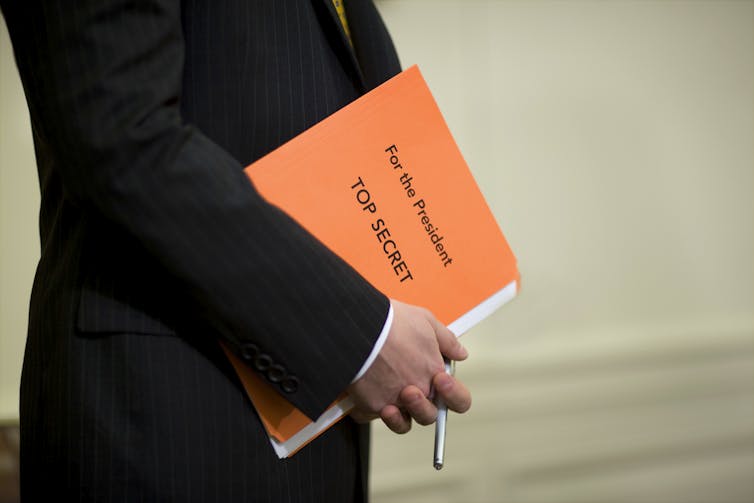Normally, a president-elect gets access to highly classified information, including a version of the President’s Daily Brief on intelligence. And the sitting president has more access and authority over the nation’s secrets than anyone else.
A criminal conviction, however, is a long-standing disqualifier for holding a security clearance – a license to access national security secrets, including documents marked Top Secret. Just being charged criminally can mean denial or loss of clearance too.
Trump also was criminally charged in Georgia state court and the Washington, D.C., federal court in relation to his efforts to overturn the 2020 election, and he was criminally charged in federal court in Florida for obstruction of justice and wrongful retention of a trove of highly sensitive documents after his first term ended.
This dilemma is one that I, as a law professor who teaches and writes about secrecy and who earlier in my career handled classified information while working for the U.S. intelligence community and a U.S. Senate committee, would never have expected.
The good news is that the law has clear answers.
Access because of his elected position
Those answers start with this legal certainty: Presidents get access to classified information because of the office they hold, not because they meet criteria in executive orders and administrative rules. The president technically does not even have a clearance. Practically and legally speaking, the president also sits at the apex of the executive branch’s massive secrecy apparatus.
Therefore, because Trump was elected to a second term, he will again have expansive access to classified information and control over it as of noon on Jan. 20, 2025, when his term begins. He will also have control over secrets and clearances available to others. The American electorate made that decision.
Before Trump again takes office, his access to classified information is in the hands of the current and outgoing president, Joe Biden. Typically, a sitting president authorizes the major party nominees, including their opponent if the incumbent is running, to have access to classified briefings during the campaign. Although U.S. intelligence officials had planned to do the usual briefings this year despite Trump’s criminal record, Trump refused them. He said he worried that the briefers would leak them and blame him.
Now that the election has been decided, reports indicate that Trump will begin receiving intelligence briefings.
It is not yet completely clear, but Trump’s election does appear to be pushing aside his numerous criminal cases. In New York state court, the judge is considering whether to dismiss the case in which he has already been convicted. And the Georgia state case may face years of delay. Because of the Justice Department’s long-standing policy against prosecuting a sitting president, special prosecutor Jack Smith is moving to abandon both federal cases and resign in advance of Trump’s threat to fire him.
The US secrecy system
Most U.S. government employees and contractors do not have or need a security clearance. But those whose jobs involve handling sensitive information must apply for clearance. If their record suggests trustworthiness, they can receive permission to access one or more of the several levels of classified information, including Confidential, Secret and Top Secret.
Federal investigators carefully screen applicants for national security positions and security clearances. To assess a candidate’s trustworthiness, investigators interview the candidate, review their application and search databases. Some investigations involve a polygraph of the candidate and interviews of people they know. Once a clearance is granted, investigators continue to monitor clearance holders.
Key factors the investigators consider include loyalty to the United States, respect for rules and the rule of law, psychological stability, good judgment and good character in terms of trustworthiness and integrity. Substance abuse, marital infidelity or financial problems can suggest poor judgment and vulnerability to blackmail or other kinds of coercion.
The president’s broad power
The president oversees the country’s entire national security secrecy system. The president has the authority to read all classified documents, to classify and declassify almost any piece of information and to oversee the security clearance system. There is no other government official who decides whether the president should have access to the nation’s secrets.
The Supreme Court has held that authority over classification and clearances flows in part from the power the Constitution gives the president. In a dangerous international security environment, the president needs to be able to know secret information about foreign threats, communicate confidentially with foreign colleagues and subordinates, and act with what Alexander Hamilton called in the Federalist Papers “secrecy, and dispatch.”
Like the president, members of Congress get access to classified information by virtue of election, not by going through the regular security clearance process.


